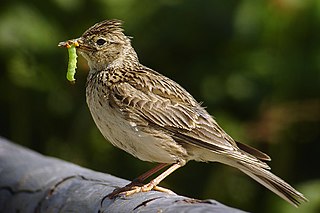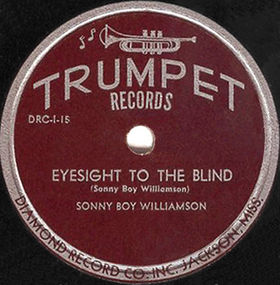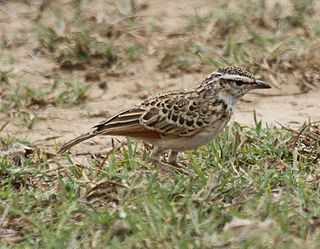The Song of the Lark may refer to:
- The Song of the Lark (painting), an 1884 painting by Jules Breton
- The Song of the Lark (novel), a 1915 novel by Willa Cather
The Song of the Lark may refer to:

Larks are passerine birds of the family Alaudidae. Larks have a cosmopolitan distribution with the largest number of species occurring in Africa. Only a single species, the horned lark, occurs in North America, and only Horsfield's bush lark occurs in Australia. Habitats vary widely, but many species live in dry regions. When the word "lark" is used without specification, it often refers to the Eurasian skylark (Alauda arvensis).

The Eurasian skylark is a passerine bird in the lark family, Alaudidae. It is a widespread species found across Europe and the Palearctic with introduced populations in New Zealand, Australia and on the Hawaiian Islands. It is a bird of open farmland and heath, known for the song of the male, which is delivered in hovering flight from heights of 50 to 100 metres. The sexes are alike. It is streaked greyish-brown above and on the breast and has a buff-white belly.

The crested lark is a species of lark widespread across Eurasia and northern Africa. It is a non-migratory bird, but can occasionally be found as a vagrant in Great Britain.

Larks' Tongues in Aspic is the fifth studio album by the English progressive rock group King Crimson, released on 23 March 1973 through Island Records in the UK and Atlantic Records in the United States and Canada. This album is the debut of King Crimson's third incarnation, featuring co-founder and guitarist Robert Fripp along with four new members: bass guitarist and vocalist John Wetton, violinist and keyboardist David Cross, percussionist Jamie Muir, and drummer Bill Bruford. It is a key album in the band's evolution, drawing on Eastern European classical music and European free improvisation as central influences.

The Bengal bush lark or Bengal lark is a species of lark in the family Alaudidae found in southern Asia.
Alouette or alouettes may refer to:
A lark is a small terrestrial bird.
Skylark is a genus of birds. It may also refer to particular species in that genus, such as the Eurasian skylark.

Jules Adolphe Aimé Louis Breton was a 19th-century French naturalist painter. His paintings are heavily influenced by the French countryside and his absorption of traditional methods of painting helped make Jules Breton one of the primary transmitters of the beauty and idyllic vision of rural existence.
"Alouette" is a popular French-language children's song, commonly thought to be about plucking the feathers from a lark. Although it is in French, it is well known among speakers of other languages; in this respect, it is similar to "Frère Jacques". Many US Marines and other Allied soldiers learned the song while serving in France during World War I and took it home with them, passing it on to their children and grandchildren.

"The Lark Ascending" is a poem of 122 lines by the English poet George Meredith about the song of the skylark. Siegfried Sassoon called it matchless of its kind, "a sustained lyric which never for a moment falls short of the effect aimed at, soars up and up with the song it imitates, and unites inspired spontaneity with a demonstration of effortless technical ingenuity... one has only to read the poem a few times to become aware of its perfection".

"Eyesight to the Blind" is a 12-bar blues song written and recorded in 1951 by Sonny Boy Williamson II. He also recorded the related songs "Born Blind", "Unseeing Eye", "Don't Lose Your Eye", and "Unseen Eye" during his career. The Larks, an American rhythm and blues group, recorded the song, which reached number five on the R&B charts in 1951. Several musicians subsequently recorded it in a variety of styles. The Who adapted Williamson's song for their rock opera Tommy.

The Indian bush lark is a species of lark in the family Alaudidae found in South Asia.

"Larks' Tongues in Aspic" is a suite of music by the English progressive rock band King Crimson. Spanning thirty years and four albums, the series comprises five parts, all of which carry unifying musical motifs. Parts I and II were released as the introductory and final tracks on King Crimson's 1973 album of the same name, part III was featured on their 1984 album Three of a Perfect Pair, part IV appeared on 2000's The Construkction of Light, and the final part, "Level Five", was included on the 2003 album The Power to Believe. Despite breaking the naming convention, Robert Fripp, King Crimson founder and only constant contributor to the suite, insists that "Level Five" is part of the pentalogy.

The foxy lark or Abyssinian lark is a species of lark in the family Alaudidae. It is found in east-central Africa.
Sarah Lark is a Welsh singer and actress who rose to fame when she competed as one of the finalists in the BBC talent show-themed television series I'd Do Anything in 2008.
Tobi Lark is an American-born Canadian soul and gospel singer, who also recorded under the names Bessie Watson and Tobi Legend. She had a top 40 hit in 1970 in Canada with "We're All in This Together". Elsewhere her best known record is "Time Will Pass You By", regarded as a classic of Northern soul, which she recorded in 1968 believing it was just a demo; it was released under the name of Tobi Legend without her approval.
Rufous winged bush lark may refer to:

Rehearsals & Blows is an album of studio sessions and rehearsals by the band King Crimson, released through the King Crimson Collectors' Club in January 2016. As with The Champaign-Urbana Sessions, this album shows the development of material intended for the group's 1984 album, Three of a Perfect Pair. King Crimson biographer and historian Sid Smith described the album as "work-in-progress sketches, outtakes, bright ideas, dead-ends and cul-de-sacs ... where ideas either bloomed or withered." Two recordings present on this release were later included in the box set On The Road, and one of them is also included in the 40th Anniversary Edition of Three of a Perfect Pair. While this release is numbered Club 42, it was released several years after Club 46 as it was delayed several times.
The lesser short-toed lark has been split into two species: